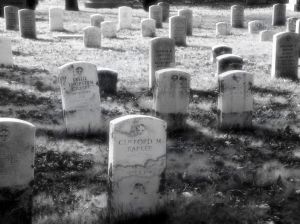W. H. Auden has written an unusual response to death in “Stop All the Clocks, Cut Off the Telephone.” The title itself demands that seemingly unreasonable actions be carried out. Why should all the clocks be stopped? Why should the telephone be cut off? The normal events of daily life, such as clocks ticking, telephones ringing, dogs barking, and pianos playing are for some reason not allowed. We do not yet know what this reason is. The imperative verbs in the first three lines of the first stanza are all controlling, forbidding words: ‘stop,’ ‘prevent,’ and ‘silence.’ Only with the first mention of death do the verbs become permitting: ‘bring,’ ‘let,’ ‘put,’ and yet another ‘let.’ A coffin and mourners are both allowed to be present. In fact, the more public happenings that do not ordinarily have anything to do with death must be made undeniably representative of it. Aeroplanes can make “moaning” noises as they fly, “public doves” must wear black bows as they take wing. Policemen are allowed to “wear black cotton gloves” as they direct traffic.
The less stern, more lenient verbs present with the mention of death suggest that a choice is possible. By giving the normally life-affirming entities a choice to represent death, the speaker is implying that they, or, in the case of the aeroplanes and doves, those who may manipulate them, would do so in the favor of death without a second thought. If they do not choose to, however, they are allowed this breach of expected conduct – it seems as if the speaker does not truly care either way. With a limp, shooing hand movement, the speaker implies that whatever happens to transform itself to represent death can or not; it is in his mind as changed already. Only the normal, private activities of life must be repressed, as the speaker’s grief has presumably interrupted the normalcy of his own life.
Calling the deceased man “my North, my South, my East and West” in line 9 implies he was the speaker’s compass; perhaps the speaker’s moral compass, or reason for traveling in any direction with his life. This brings up the question of the speaker’s relationship to the dead man: friend, relative, lover? Whichever the connection, the reader can assume the speaker loved the man dearly. Declaring the dead man “my working week and my Sunday rest” suggests that the latter was the speaker’s entire life, since work and ‘Sunday rest,’ or relaxation/time spent not working, usually comprise the overarching categories of adult life. The following concepts the speaker insists the man embodies, his ‘noon,’ ‘midnight,’ ‘talk,’ and ‘song,’ fall into the more complex realms within ‘rest.’ ‘Noon’ could stand for the playful heat and relaxation commonly associated with noon; ‘midnight’ a solemn, mysterious, bewitched time – the parts of a human relationship that are mysterious and never truly understood. ‘Talk’ implies discussion of serious subjects, whereas ‘song’ suggests merriment and fun. The four terms cover a complex and diverse swathe of human life, suggesting that the dead man was a large part of the speaker’s life.
In the last line of the third stanza, the speaker says that he was wrong in thinking “that love would last for ever”. This brings up the possibility that the poem is not about death at all. The speaker could be suggesting that death has ended the love between himself and the man, but could also be insinuating that the entire poem is an exaggerated outpouring of emotions loosed by the end of a relationship.
In the last stanza, the heavenly bodies that create noon and midnight are ordered to be destroyed, with the harsh finality of the imperatives in the first three lines of the poem. The most constant bodies that have been around since the birth of man and helped sustain him, as the speaker must feel the ‘deceased’ man has been, must be disposed of. The speaker’s audience is ordered to “pack up the moon,” “dismantle the sun,” “pour away the ocean,” and “sweep up the wood.” In this case, ‘wood’ might stand for the trees of forests, which create oxygen, equally as essential for human survival as the light of the sun and water, and as the speaker feels the dead man was to his continued existence. Even the stars, the last glimmers of hope lighting up the dark, unfathomable sky of human life, must be “put out.”
The last line, a depressing assertion that “nothing now can ever come to any good,” reaffirms the possibility that the poem may be about an ended relationship. With a true removed from the speaker’s life in some way, but still alive, he may feel that his life is hopeless until the man is persuaded to enter the relationship again with the speaker. With a true love dead, the man may feel that any chance for happiness and genuine connection with another in his life is dashed for good. Every time he attempts to engage in the daily activities that form the backbone of his life, he will be alone, his true love destroyed like the poem demands of the ocean and stars, and feel hopeless. Auden has taken the universal, inarticulate despair everyone feels when somehow losing a loved one, and successfully articulated it.
